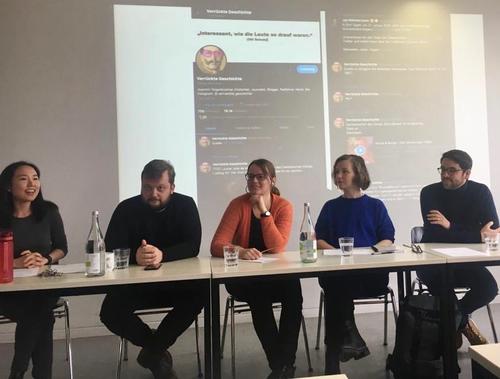Reflecting on the Panel Discussion "From Twitter to Podcasts: Communicating the Past in the Digital Age"
The panel: from left to right, Sophie-Jung Kim (chair), Florian Wittig, Melanie Huchler, Lucy Burns, and Joachim Telgenbüscher.
News from Jan 30, 2020
On 27 January, the Emmy Noether Research Group Reaching the People hosted the panel discussion “From Twitter to Podcasts: Communicating the Past in the Digital Age” at the Friedrich Meinecke Institute in Berlin. Chaired by the group’s post-doctoral fellow Dr Sophie-Jung Kim, the panel probed the digitalization of communication, and the ways in which history could be communicated in this new milieu. The speakers who came to the event work with various media platforms: Lucy Burns, a producer and presenter for the Witness History podcast series on the BBC World Service, Melanie Huchler, an exhibition curator for the Deutsches Historisches Museum, Joachim Telgenbüscher, a print journalist, curator of the popular Twitter account "Verrückte Geschichte" (@drguidoknapp), and podcast host, and Florian Wittig, a producer for Real Time History GmbH, the makers of the popular YouTube documentary series “The Great War”.
Together, the panelists discussed the opportunities that the digital age offers to those who seek to communicate historical ideas to wider publics. They highlighted the ways in which on demand platforms such as YouTube provide new spaces for “deep dive” content on niche subjects which might only receive cursory attention in traditional television or film formats. Similarly, Twitter and Instagram can help bring historical topics into the daily lives of young audiences who are less likely to read print media. New formats like podcasts can also create more intimate, emotional ways of transferring knowledge, when audio becomes a “companion” of people who commute to work, or do housework, expanding the scope of the audience beyond gender and age boundaries. Museums are increasingly recognizing the ways in which digital media can help broaden access to exhibitions, for instance when audiences in rural areas or abroad seek to engage with the exhibits. We also saw the potential and new initiatives of bridging different media such as between museums and online content producers.
Digital media also brings unique challenges and pressing moral questions. Several participants raised the impact of the “attention economy” on the type of history that gets exposed to their audience. In an age where clicks generate revenue and algorithms determine clicks, participants shared strategies for managing the balance between reaching, and maintaining, large audiences whilst producing thought-provoking, high-quality material that complicates or challenges narratives of the past. In light of the rise of populism, panelists also discussed the ways in which digital media is being instrumentalised to push nationalistic historical tropes. This, however, only made the role of historians in producing different stories and shedding light on historical topics that are often neglected more necessary and urgent. The panelists also emphasised the use of humor in using non-conventional medium of communication. Last but not least, they opened new opportunities for historians to use digital media, whether in starting new platforms, or in collaborating with existing projects. This, certainly, has left us with much food for thought.

